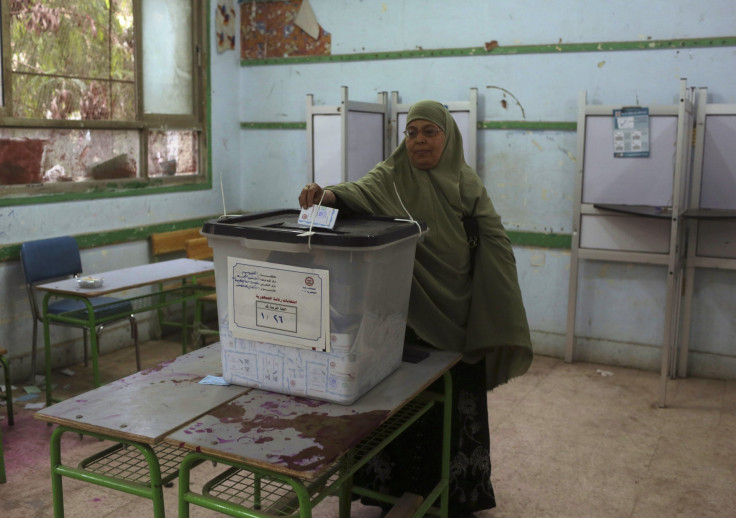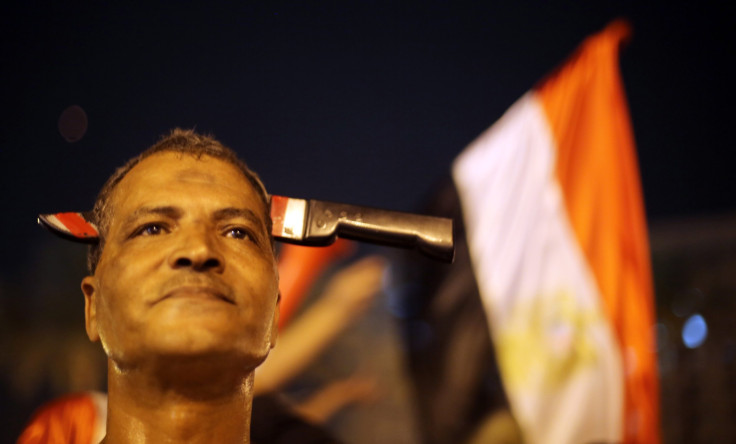Sisi Set To Crush Competition In Egyptian Presidential Election, But What Does That Mean For Egyptians?

Early results on Wednesday night show ex-Field Marshal Abdel Fattah el-Sisi to win the Egyptian presidential election by a landslide.
As of the time of publishing, Sisi had gained 97 percent of votes and had not lost in any governorates, according to the Tahrir Institute for Middle East Policy’s interactive voting map. Votes continue to be tallied but with only 3 percent so far, it doesn't look like Sisi’s only opponent in the race, Hamdeen Sabahi, has a chance.
Sabahi tweeted after the numbers were announced, saying, "To the young men and women of my campaign: you held on to your dream, you fought for it courageously, and you paid the price with consent. You are the bravest, noblest, and the lasting ... I trust you and I'm proud of you."
الى شابات وشباب حملتى : اعتصمتم بحلمكم ، دافعتم عنه ببسالة ، ودفعتم الثمن برضا.. أنتم الأشجع والأنبل والأبقى .. أثق فيكم وأفخر بكم.
— حمدين صباحي (@HamdeenSabahy) May 28, 2014 In fact, Sabahi is in third place, trailing behind the number of spoiled ballots. This means that almost everyone who voted, voted for Sisi, which doesn't bode well for establishing a democracy, but was long expected. Before Sisi announced his candidacy, some Egyptians began an unofficial campaign, predicting that he would get more than 90 percent if he ran. “That is, of course, if anyone runs against him,” Abdel Nabi Adel Sattar, the effort’s spokesman, told the Washington Post. “When somebody with the status of Gen. Sisi runs for president, it will make everyone else who’s not qualified think twice about running against him."
depressing RT @shadihamid @Max_Fisher The Restoration of Egyptian Democracy: pic.twitter.com/HKiKohRLd7 via @Max_Fisher
— Michael McFaul (@McFaul) May 28, 2014It’s ok, Void Ballots. You ran a respectable campaign.
— Basil الضبع (@basildabh) May 28, 2014Hundreds of Egyptians are reportedly already flocking to Tahrir Square in Cairo, the main hub of both the 2011 Egyptian uprising that toppled Hosni Mubarak and the 2013 revolt that ousted Mohammad Morsi, to celebrate Sisi’s victory.
Last June, Sisi announced Morsi’s ouster and around that time, assured the Egyptian people that he would not run for president. Nearly a year later, he is set to become Egypt's next president.

Sisi now faces a long road to fixing Egypt’s many ills. Back in 2013, Egyptians’ biggest woe was the economy. Right before Morsi’s ouster, unemployment was at an all-time high at 13.2 percent and inflation was 8.2 percent, according to the Egyptian blog Rebel Economy. What’s more, the constant electricity and gasoline shortages that plagued everyday Egyptians have not ceased and in fact, have worsened over the last few months.
Earlier this week, Sisi released his “map of the future." Much of the plan, which is reminiscent of Mubarak’s strategies, involves building cities in Egypt’s deserts where the population could live off the land. This would cost an estimated $140 billion, which Sisi said he would get from foreign investors and donations from Egyptians living abroad, that is he won’t be using tax dollars.

In 2013, Egyptians were also concerned about their freedom of religion and freedom of speech, particularly for Christian and more secular Egyptians under Morsi’s rule. Today, the tables have turned against the Muslim Brotherhood, which has been declared a terrorist organization in Egypt. More than 700 Egyptians have been sentenced to death in the last months for their involvement in the group and that’s not counting that hundreds, mostly students, who have been arrested for protesting what they call “military rule.”
The press has been taking a hit as well. Before voting began, a notice on Egypt’s State Information Service website warned that “anyone who reports false news about the elections will be subject to jail terms, noting that candidates who violate the regulations of electioneering will be fined between EGP 100,000 to 1,000,000 [$14,000 to $140,000]."
Only time will tell how Sisi’s reign will differ from his predecessors', but voter turnout suggest that he may not be as loved as the 97 percent figure leads one to believe. More than 25 million people participated in the elections, but that was only 47 percent of eligible voters.
Egypt’s Presidential Elections Committee said the official elections results will be announced by June 1 or 2.
© Copyright IBTimes 2024. All rights reserved.






















